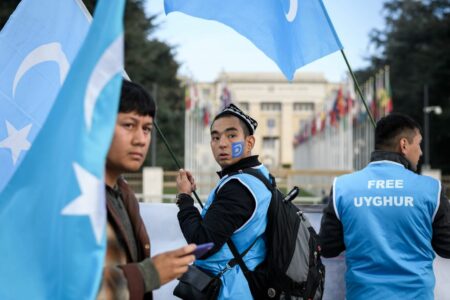Human rights violations are a serious issue but in the international arena such allegations (whether true, false or exaggerated) are often weaponized.
Written by Uriel Araujo, researcher with a focus on international and ethnic conflicts
In preparation of the CCP Congress, which started on October 16, there have been several arrests of supposed Uyghur extremists in China, once again highlighting the issue, after the recent United Nations vote. The UN on October 6 voted against a report written by its own human rights commissioner, Michelle Bachelet, which accused Beijing of human rights abuses against Uyghur Muslims and possible “crimes against humanity.” Those are of course very serious allegations. The “last minute” August 31 report itself was in fact published literally only 11 minutes before Bachelet term ended at midnight Geneva time and it appears publication was delayed due to intense Chinese pressure. The voting’s outcome has been interpreted as a display of China’s political power, but is also a sign that the Western persistent weaponization of the issue of human rights is losing force.
Beijing indeed has been facing some growing domestic security problems pertaining to terrorism and extremism among sectors of its minority Muslim population. These are issues that transcend boundaries and regions and thus concern many different states, as Mordechai Chaziza, an Ashkelon Academic College (Israel) senior lecturer, concludes in his 2018 study.
Political-religious extremism is a security concern for Eurasian powers, as exemplified by Chinese-Russian and Chinese-Pakistani cooperation on such matters in Central Asia. Counter-terrorism is obviously a national security priority for any state, but the hard truth is that Washington prioritizes antagonizing Beijing over combating terrorism.
Building upon the controversial nature of some of the Chinese initiatives (such as the “Vocational Education and Training Centers” to combat Islamic extremism, which critics have described as “concentration camps”), the US has been hoping to engage Muslim-majority countries and their civil societies to urge their leaders to restrict businesses with China, thus decreasing the flow of oil to China and making South Asian states block Beijing’s low-interest infrastructure projects.
The humanitarian concerns in this case can only appear hypocritical, considering the fact that the US itself, in the name of its “war on terror”, for over 20 years has employed “indefinite detention”, and has tortured and held hundreds of adult men and minors as prisoners in Guantanamo Bay, as well as in secret prisons and CIA “black sites” in over 50 countries (without due process of law), as the Human Rights Watch (HRW) reports.
An institutional culture of torture is deeply rooted in American policies: after his 2002 “Torture Memos”, then Deputy Assistant Attorney General of the US John Yoo, was asked (by Notre Dame Law Professor Doug Cassel) if the US President had the right to order the torture of anyone, including by “crushing the testicles of the person’s child”, and he answered that “I think it depends on why the President thinks he needs to do that” – an outrageous claim he renewed in 2010. Former Vice President Dick Cheney in turn has repeatedly defended the use of torture, even if innocents are harmed, as he claimed in a 2014 NBC interview. Today, although President Biden has stated his intention to close the infamous Guantanamo base, he has not taken any concrete steps and has actually fought to cover-up the CIA torture programs. All of this makes the US arguably the greatest torturer state in the world.
The larger context of the human rights-centered American diplomatic campaign against China is of course the so-called new cold war of today with its pressures for bipolarity and the trade war the US-led West has been waging against the Asian superpower since at least the summer of 2018 (under Donald Trump). Such an ongoing war includes the imposition of several tariffs, the American August 2020 targeting of TikTok, and so on. It is certainly no coincidence that, amid this commercial war, Donald Trump signed the Uyghur Human Rights Policy Act of 2020, which called for sanctions against Beijing over the issue, even though Trump himself (according to his own former U.S. National Security Advisor John Bolton) fully approved of the Chinese anti-terrorism initiatives.
President Joe Biden has maintained the policies of his predecessor (notably regarding trade dispute in the tech sector), and has added a more overtly military element to this great power’s dispute, as part of Washington’s aggressive “encirclement” policy against Beijing. This approach includes acronym-named new groupings such as the QUAD, and the AUKUS. All these provocations (plus the American ongoing attempts to coopt India) are now escalating US-Chinese tensions over the issues of Taiwan and Australia’s nuclear submarines deal, thereby increasing the risk of regional and even global war. The human rights narrative, to put it bluntly, plays an important propaganda part in the wars of narratives that are part of any conflict.
India’s recent abstention at the UNHRC vote on the Uyghur issue, despite the notorious Indian-Chinese tensions, is yet another example of how the policy of states is driven by pragmatism and realism after both Asian powers have moved back troops from their disputed border area.
All states must fight terrorism and threats to its national security, but torture is an evil that has to be denounced by civil society. In the international arena, however, such allegations and accusations (whether true, false or exaggerated) are often weaponized. Be it as it may, the US has clearly no moral ground on the issue – quite on the contrary. And this very fact diminishes the efficacy of its propaganda campaigns in the new age of multi-alignment and non-alignment.






